Unit1Schoollife全部教案
- 格式:pdf
- 大小:1.17 MB
- 文档页数:23
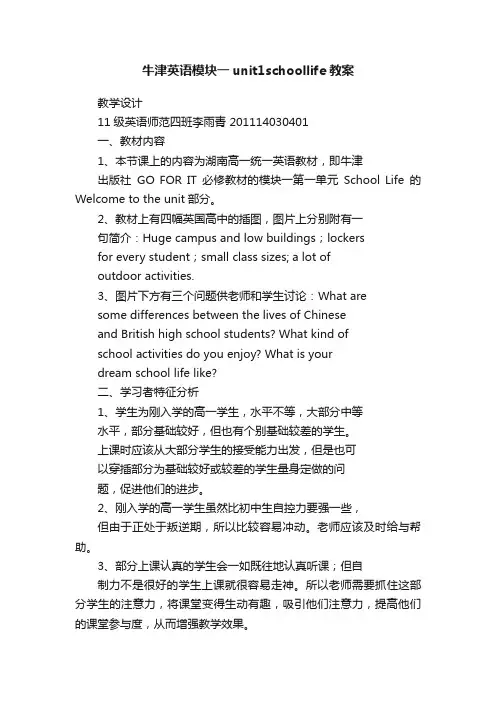
牛津英语模块一unit1schoollife教案教学设计11级英语师范四班李雨青 201114030401一、教材内容1、本节课上的内容为湖南高一统一英语教材,即牛津出版社GO FOR IT必修教材的模块一第一单元School Life的Welcome to the unit部分。
2、教材上有四幅英国高中的插图,图片上分别附有一句简介:Huge campus and low buildings;lockersfor every student;small class sizes; a lot ofoutdoor activities.3、图片下方有三个问题供老师和学生讨论:What aresome differences between the lives of Chineseand British high school students? What kind ofschool activities do you enjoy? What is yourdream school life like?二、学习者特征分析1、学生为刚入学的高一学生,水平不等,大部分中等水平,部分基础较好,但也有个别基础较差的学生。
上课时应该从大部分学生的接受能力出发,但是也可以穿插部分为基础较好或较差的学生量身定做的问题,促进他们的进步。
2、刚入学的高一学生虽然比初中生自控力要强一些,但由于正处于叛逆期,所以比较容易冲动。
老师应该及时给与帮助。
3、部分上课认真的学生会一如既往地认真听课;但自制力不是很好的学生上课就很容易走神。
所以老师需要抓住这部分学生的注意力,将课堂变得生动有趣,吸引他们注意力,提高他们的课堂参与度,从而增强教学效果。
三、教学(学习)目标1、使学生掌握基本的关于学校设备的单词。
2、使学生从初中过渡到高中,认识到初中和高中的区别。
3、使学生认识到中国高中和英国高中的区别。
4、使学生能用英语大致地表达出自己的想法。
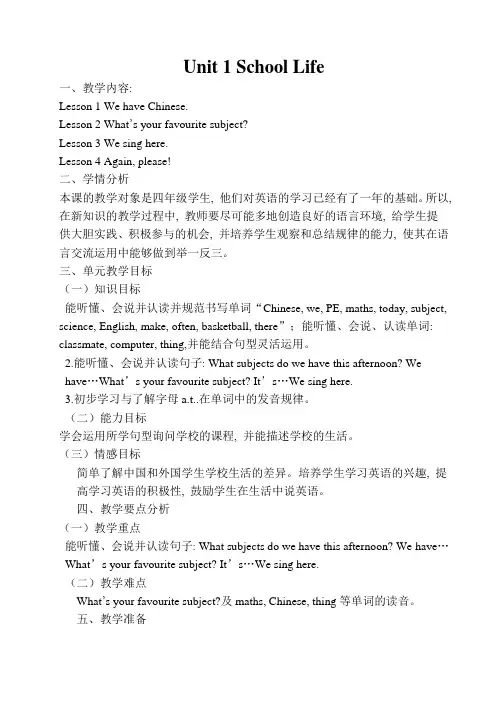
Unit 1 School Life一、教学内容:Lesson 1 We have Chinese.Lesson 2 What’s your favourite subject?Lesson 3 We sing here.Lesson 4 Again, please!二、学情分析本课的教学对象是四年级学生, 他们对英语的学习已经有了一年的基础。
所以, 在新知识的教学过程中, 教师要尽可能多地创造良好的语言环境, 给学生提供大胆实践、积极参与的机会, 并培养学生观察和总结规律的能力, 使其在语言交流运用中能够做到举一反三。
三、单元教学目标(一)知识目标能听懂、会说并认读并规范书写单词“Chinese, we, PE, maths, today, subject, science, English, make, often, basketball, there”;能听懂、会说、认读单词: classmate, computer, thing,并能结合句型灵活运用。
2.能听懂、会说并认读句子: What subjects do we have this afternoon? We have…What’s your favourite subject? It’s…We sing here.3.初步学习与了解字母a.t..在单词中的发音规律。
(二)能力目标学会运用所学句型询问学校的课程, 并能描述学校的生活。
(三)情感目标简单了解中国和外国学生学校生活的差异。
培养学生学习英语的兴趣, 提高学习英语的积极性, 鼓励学生在生活中说英语。
四、教学要点分析(一)教学重点能听懂、会说并认读句子: What subjects do we have this afternoon? We have…What’s your favourite subject? It’s…We sing here.(二)教学难点What’s your favourite subject?及maths, Chinese, thing等单词的读音。

【关键字】英语课题: M1U1 School Life【教学目标】1.to introduce and develop the theme of School Life;2.to get more specific information about Senior One students who have just stepped into a fresh new life;3.to enable students to get more chances of practicing l istening and speaking skills;4.to guarantee effective communication among students.【教学重点】How to have Ss fully participate in the discussion?【教学难点】How to ask Ss practice their spoken English and share their opinions with others?【教具】Multi-media projector【教学过程】【二次备课】Step 1 Greeting and lead-inWelcome to our English class. I’m very glad to see you here.It’s the beginning of a new team you have just finished juniorschool and are about to enter a new period in your studies.In your opinion, what do you think of your school life?School life: excitement, challenges, success, laughter’s,tears, joys, sorrows, dreams, discoveries,failures.Step2welcome to the UnitT: High school is a time of discovery, learning and hard work.You should cherish the time and makeProgress every day. I can see you’re eager to know whatstudying at senior high will be like inChina?Is it different from other countries. Let’s compare them.In the British High SchoolIn the Chinese High School1.huge campus and low-rise buildinglarge campus and tall buidings2.locker for every studentnone has such equipment3. fewer students in each class 40-50-604. at ease with teachersbe friendly to each otherstep3 DiscussionT: Discuss the three questions on page1Can you dream of your school life? ( teacher? Students?Classmates?) what characteristics should theyhave?Teachers: fair, patient, learned, humorous, co-operative,energeticStudents: diligent, e nergetic, civilized, polite,competitive, co-operate, open-minded,strong-mindedT: very good. Teachers and students should cooperate with eachotherTeacher s hould love / learn from/ encourage/ understand/help/ respectT: only in this way. Can we make progress every day and achievesuccess. How can we achieve Success?(courage, belief, luck, diligence, perseverance,intelligence,confidence, competence,cooperation, wisdom, determination)T: like a scientist bent on making a discovery, we must cherishthe hope that one day we will rewarded.Some useful saying1.Life is a bumpy road.2.where there is a will, there is a way.3.Failure is the mother of success.Step4 Language points1.High school is a time of discovery, learning and hard work.抽象名词time, means, knowledge, collection, 在具体语境中,即后面有of短语或后接一个定语从句,前面要加不定冠词a/anThere was on ce a time when I hated to go to school.have a good knowledge of English 精通英语have a large collection of coins2.What are some differences between……?参考金榜直通P2补充:tell the difference between A and B= tell A from B 3.What is your dream school like?What is sth like? 某物是什么样的?What is sb like? 某人的(性格、外貌....)是什么样的?What does sb/ sth look like?某人(某物)看起来是什么样的?How is sth?某物的质量如何?How is sb?某人的身体怎样?补充:你觉得…..怎么样?How do you like/find ……?What do you think of ……?What do you like about ……?发散:like doing/ to do 喜欢做....Would ike to do 愿意做....feel like doing 想做.....Sound like 听起来像......【作业布置】【教学后记】此文档是由网络收集并进行重新排版整理.word可编辑版本!。
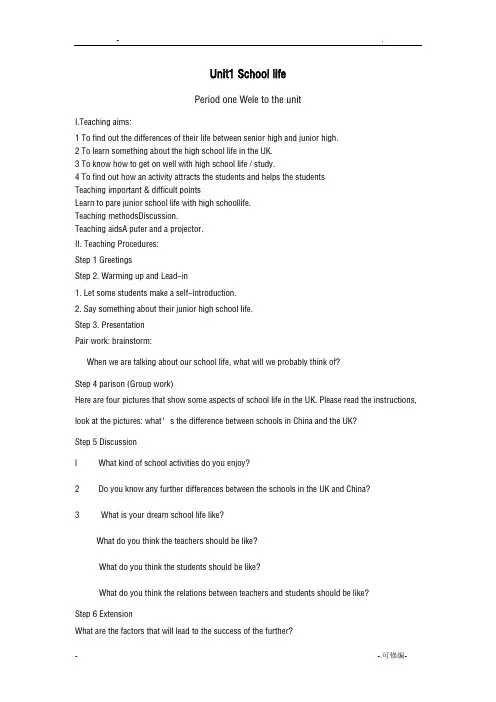
Unit1 School lifePeriod one Wele to the unitI.Teaching aims:1 To find out the differences of their life between senior high and junior high.2 To learn something about the high school life in the UK.3 To know how to get on well with high school life / study.4 To find out how an activity attracts the students and helps the studentsTeaching important & difficult pointsLearn to pare junior school life with high schoollife.Teaching methodsDiscussion.Teaching aidsA puter and a projector.II. Teaching Procedures:Step 1 GreetingsStep 2. Warming up and Lead-in1. Let some students make a self-introduction.2. Say something about their junior high school life.Step 3. PresentationPair work: brainstorm:When we are talking about our school life, what will we probably think of?Step 4 parison (Group work)Here are four pictures that show some aspects of school life in the UK. Please read the instructions, look at the pictures: what’s the difference between schools in China and the UK?Step 5 Discussionl What kind of school activities do you enjoy?2Do you know any further differences between the schools in the UK and China?3What is your dream school life like?What do you think the teachers should be like?What do you think the students should be like?What do you think the relations between teachers and students should be like?Step 6 ExtensionWhat are the factors that will lead to the success of the further?Step 7 SummaryHomework1) Recall all the new words and expressions that appear in this unit.2) Write a short passage about your dream school. (100words)3) Preview the following lesson.Period 2 ReadingTeaching aims:1. To read a magazine article about school life in the UK.2. To learn to apply two basic reading skills: skimming and scanning.3. To learn some expressions about school life.Teaching Important Points:Help the students to understand the passage better.Learn and master some important words and phrases in this period.Teaching Difficult Point:How to help the students improve their reading ability and understand the passage better.How to master the important language points in this passage.Teaching Methods: Fast reading ,Careful reading, DiscussionExplanation to help the students master some language points.Teaching Aids:A tape recorder.A multimedia.Teaching procedures:Step 1 RevisionCheck the homework exercise.Step 2 PresentationYesterday we discussed the differences between high schools in our country and the UK.Now we are going to read a magazine article which is written by an exchanging student. She has been studying in the UK for one year. Now she gives a clear brief introduction about her school life there.Before we read the article, we are going to learn the reading strategy: skimming and scanning. Skimming: to get a general idea of the article.Scanning: to locate specific information about an article.Step 3 Reading1. Skimming question:How does Wei Hua feel about her life in the UK?2. Scanning:1)What topics are mentioned in the WeiHua’s letter?(opt. are the following aspects of school life mentioned in the article?Teachers classmates friends subjects homework grades timetable activities school facilities host family food hobbies customs traditions festivals)2)Scan the passage and plete Part C1, C2 on page 4Step 4 Group workWhat’s the similarity and difference between the schools in China and the UK?Step 5 Practice:Pair workNow you are a reporter from the school magazine, and have a chance to interview Wei Hua. What other information would you like to know about her life and study in the UK?Suppose your desk mate is Wei Hua, make a dialogue.Homework.1. plete parts D and E2. Read the two articles in reading on pages 82 and 83 in wb and answers the questions below them.3. Daniel Adams will e to your school as an exchange student. Write a letter to him and introduce your school life to him.4. Preview the following lesson.Period 3-4 Language focusTeaching aims:To learn some expressions about school life.Teaching Important Points:Help the students to understand the passage better.Learn and master some important words and phrases in this period.Teaching Difficult Point:How to help the students understand the passage better.How to master the important language points in this passage.Teaching Methods: Explanation to help the students master some language points.Teaching Aids:A tape recorder. A multimedia.Step 1 Revision:1. Check the homework2. plete the chart and retell the letter.Step 2. Language focus1. Words:a)attend (join / join in / take part in )b)preparec)miss (missing / gone / lost)d)experiencee)informationf)sounds2. Phrases:a)for freeb)a bit / a littlec)as well as3. Sentences:a)Going to a British school for one year has been a very enjoyable and exciting experience for me.b)I do like eating.Step 5. Practice1. plete wb A1, A2,2. Translation1)Jim加入了我们的讨论之列。
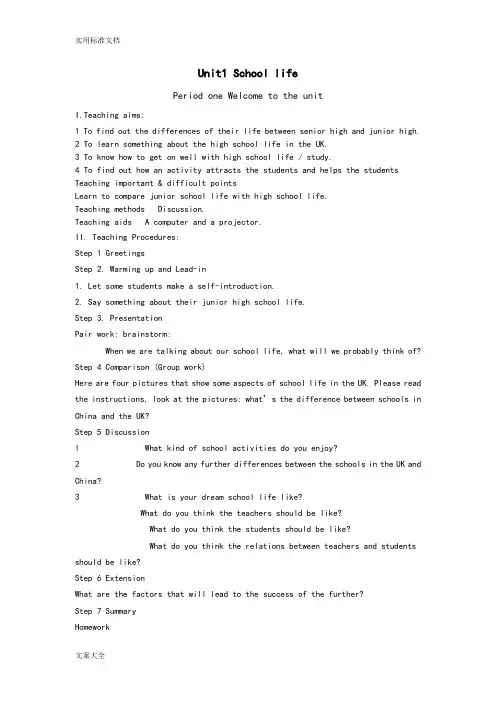
Unit1 School lifePeriod one Welcome to the unitI.Teaching aims:1 To find out the differences of their life between senior high and junior high.2 To learn something about the high school life in the UK.3 To know how to get on well with high school life / study.4 To find out how an activity attracts the students and helps the students Teaching important & difficult pointsLearn to compare junior school life with high school life.Teaching methods Discussion.Teaching aids A computer and a projector.II. Teaching Procedures:Step 1 GreetingsStep 2. Warming up and Lead-in1. Let some students make a self-introduction.2. Say something about their junior high school life.Step 3. PresentationPair work: brainstorm:When we are talking about our school life, what will we probably think of? Step 4 Comparison (Group work)Here are four pictures that show some aspects of school life in the UK. Please read the instructions, look at the pictures: what’s the difference between schools in China and the UK?Step 5 Discussionl What kind of school activities do you enjoy?2 Do you know any further differences between the schools in the UK and China?3 What is your dream school life like?What do you think the teachers should be like?What do you think the students should be like?What do you think the relations between teachers and students should be like?Step 6 ExtensionWhat are the factors that will lead to the success of the further?Step 7 SummaryHomework1) Recall all the new words and expressions that appear in this unit.2) Write a short passage about your dream school. (100words)3) Preview the following lesson.Period 2 ReadingTeaching aims:1. To read a magazine article about school life in the UK.2. To learn to apply two basic reading skills: skimming and scanning.3. To learn some expressions about school life.Teaching Important Points:Help the students to understand the passage better.Learn and master some important words and phrases in this period.Teaching Difficult Point:How to help the students improve their reading ability and understand the passage better.How to master the important language points in this passage.Teaching Methods: Fast reading ,Careful reading, DiscussionExplanation to help the students master some language points.Teaching Aids:A tape recorder. A multimedia.Teaching procedures:Step 1 RevisionCheck the homework exercise.Step 2 PresentationYesterday we discussed the differences between high schools in our country and the UK.Now we are going to read a magazine article which is written by an exchanging student. She has been studying in the UK for one year. Now she gives a clear brief introduction about her school life there.Before we read the article, we are going to learn the reading strategy: skimming and scanning.Skimming: to get a general idea of the article.Scanning: to locate specific information about an article.Step 3 Reading1. Skimming question:How does Wei Hua feel about her life in the UK?2. Scanning:1) What topics are mentioned in the WeiHua’s letter?(opt. are the following aspects of school life mentioned in the article?Teachersclassmates friends subjects homework grades timetable activities school facilities hostfamily food hobbies customs traditions festiv als)2) Scan the passage and complete Part C1, C2 on page 4Step 4 Group workWhat’s the similarity and difference between the schools in China and the UK? Step 5 Practice:Pair workNow you are a reporter from the school magazine, and have a chance to interview Wei Hua. What other information would you like to know about her life and study in the UK?Suppose your desk mate is Wei Hua, make a dialogue.Homework.1. Complete parts D and E2. Read the two articles in reading on pages 82 and 83 in wb and answers the questions below them.3. Daniel Adams will come to your school as an exchange student. Write a letter to him and introduce your school life to him.4. Preview the following lesson.Period 3-4 Language focusTeaching aims:To learn some expressions about school life.Teaching Important Points:Help the students to understand the passage better.Learn and master some important words and phrases in this period.Teaching Difficult Point:How to help the students understand the passage better.How to master the important language points in this passage.Teaching Methods: Explanation to help the students master some language points. Teaching Aids:A tape recorder. A multimedia.Step 1 Revision:1. Check the homework2. Complete the chart and retell the letter.Step 2. Language focus1. Words:a) attend (join / join in / take part in )b) preparec) miss (missing / gone / lost)d) experiencee) informationf) sounds2. Phrases:a) for freeb) a bit / a littlec) as well as3. Sentences:a) Going to a British school for one year has been a very enjoyable and exciting experience for me.b) I do like eating.Step 5. Practice1. Complete wb A1, A2,2. Translation1)Jim加入了我们的讨论之列。
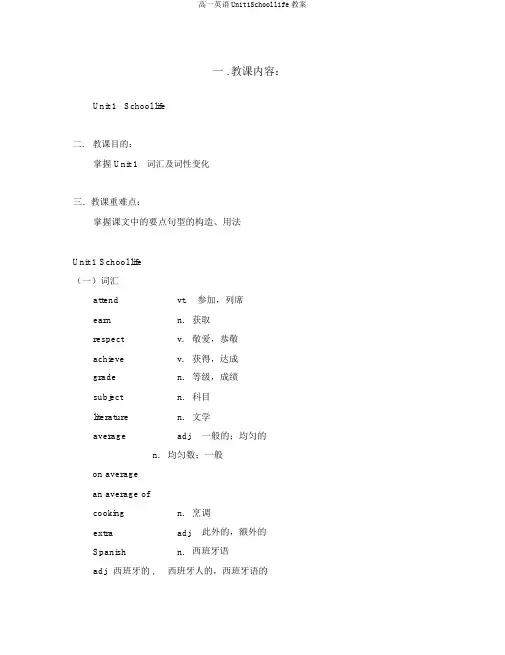
一 .教课内容:Unit 1School life二.教课目的:掌握 Unit 1词汇及词性变化三.教课重难点:掌握课文中的要点句型的构造、用法Unit 1 School life(一)词汇attend vt.参加,列席earn n.获取respect v.敬爱,恭敬achieve v.获得,达成grade n.等级,成绩subject n.科目literature n.文学average adj.一般的;均匀的n.均匀数;一般on averagean average ofcooking n.烹调extra adj.此外的,额外的Spanish n.西班牙语adj. 西班牙的 ,西班牙人的,西班牙语的etc.等等miss v.思念dessert n.餐后甜点dessert , desert /e/dessert表示甜点,而desert表示荒漠。
可是desert也能够发 / i /,这时它是作为动词,意思是扔掉,离弃。
例:荒岛 a deserted islandexperience vt.经历,体验辨析experience和experimentexperience表示经验,经历,而experiment表示实验。
注意两个单词拼法上的差别。
article vt.文章immediately vi马上,马上(二)课文重难点1. meanv.意味What do you mean?1) mean that + 宾语从句我是说你不需要今日就达成。
I mean you needn ’t finish it today.2) mean doingFalling into the river on such a cold day means losing your life.学好英语意味着花大批的时间。
Learning English means spending a lot time.3) mean to do计划=plan to doI didn ’t mean to hurt you.我们本打算给你一个欣喜的。
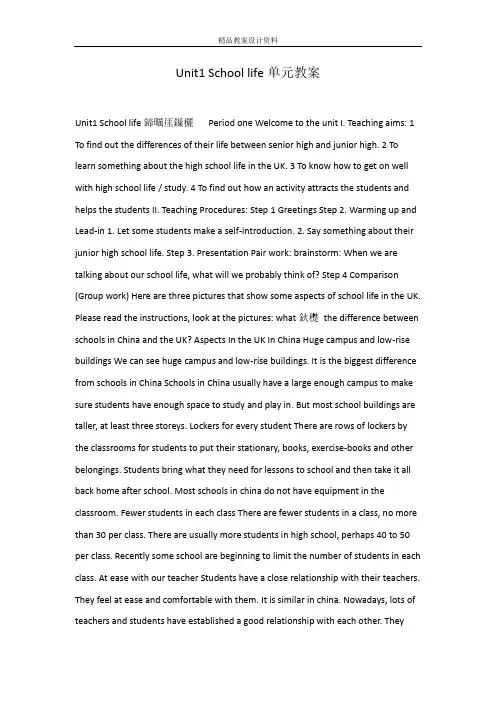
Unit1 School life单元教案Unit1 School life Period one Welcome to the unit I. Teaching aims: 1 To find out the differences of their life between senior high and junior high. 2 To learn something about the high school life in the UK. 3 To know how to get on well with high school life / study. 4 To find out how an activity attracts the students and helps the students II. Teaching Procedures: Step 1 Greetings Step 2. Warming up and Lead-in 1. Let some students make a self-introduction. 2. Say something about their junior high school life. Step 3. Presentation Pair work: brainstorm: When we are talking about our school life, what will we probably think of? Step 4 Comparison (Group work) Here are three pictures that show some aspects of school life in the UK. Please read the instructions, look at the pictures: what鈥檚the difference between schools in China and the UK? Aspects In the UK In China Huge campus and low-rise buildings We can see huge campus and low-rise buildings. It is the biggest difference from schools in China Schools in China usually have a large enough campus to make sure students have enough space to study and play in. But most school buildings are taller, at least three storeys. Lockers for every student There are rows of lockers by the classrooms for students to put their stationary, books, exercise-books and other belongings. Students bring what they need for lessons to school and then take it all back home after school. Most schools in china do not have equipment in the classroom. Fewer students in each class There are fewer students in a class, no more than 30 per class. There are usually more students in high school, perhaps 40 to 50 per class. Recently some school are beginning to limit the number of students in each class. At ease with our teacher Students have a close relationship with their teachers. They feel at ease and comfortable with them. It is similar in china. Nowadays, lots of teachers and students have established a good relationship with each other. Theyrespect each other and work to gain a better understanding of each other. Step 5 Discussion l What kind of school activities do you enjoy? 2 Do you know any further differences between the schools in the UK and China? 3 What is your dream school life like? What do you think the teachers should be like? What do you think the students should be like? What do you think the relations between teachers and students should be like? Step 6 Extension What are the factors that will lead to the success of the further? Step 7 Summary Homework 1) Recall all the new words and expressions that appear in this unit. 2) Write a short passage about your dream school. (100words) 3) Preview the following lesson.Teaching Plan for Unit 1 School life Period two ReadingTeaching aims: 1. To read a magazine article about school life in the UK. 2. To learn to apply two basic reading skills: skimming and scanning. 3. To learn some expressions about school life. Teaching procedures: Step 1 Revision Check the homework exercise. Step 2 Presentation Yesterday discussed the differences between high schools in our country and the UK. Now we are going to read a magazine article which is written by an exchanging student. She has been studying in the UK for one year. Now she gives a clear brief introduction about her school life there. Before we read the article, we are going to learn the reading strategy: skimming and scanning. (P.3: Reading strategy) Skimming: to get a general idea of the article. Focus on the title, heading, captions, the first and last sentences of paragraphs, charts and pictures 鈥?Scanning: to locate specific information about an article. Look for key words and phrases, dates and words in bold, italics or capital letters鈥?Step 3 Reading 1. Skimming question: How does Wei Hua feel about her life in the UK? 2. Scanning: 1) What topics are mentioned in the WeiHua鈥檚letter? (opt. are the following aspects of school life mentioned in the article? Teachers classmates friends subjects homework grades timetable activities school facilities host family food hobbies customs traditions festivals) 2) Scan the passage and complete Part C1, C2 on page 4 Step 4 Group workWhat鈥檚the similarity and difference between the schools in China and the UK?鈽?Aspects In the UK In China similarity difference Step 5 Practice: Pair work Now you are a reporter from the school magazine, and have a chance to interview Wei Hua. What other information would you like to know about her life and study in the UK Suppose your desk mate is Wei Hua, make a dialogue. Homework. 1. Complete parts D and E 2. Read the two articles in reading on pages 82 and 83 in wb and answers the questions below them. 3. Daniel Adams will come to your school as an exchange student. Write a letter to him and introduce your school life to him. 4. Preview the following lesson.Teaching Plan for Unit 1 School life Period three Language focusStep 1 Revision: 1. Check the homework 2. Complete the chart and retell the letter. On the first day Teachers Mr. Heywood Miss Burke Size of a classroom Subjects Food Wei Hua鈥檚feelings and progress Step 2. Language focus 1. Words: a) attend (join / join in / take part in ) b) prepare c) miss (missing / gone / lost) d) experience e) information f) sounds 2. Phrases: a) for free b) a bit / a little c) as well as 3. Sentences: a) Going to a British school for one year has been a very enjoyable and exciting experience for me. b) I do like eating. Step 5. Practice 1. Complete wb A1, A2, 2. Translation 1)Jim?Jim joined us in the discussion. 2)Jane?Jane is busy preparing for their lessons. 3)鎴戦敊杩囦簡鏃╃彮鍏?I missed the early bus. 4锛夌粡楠屾槸鏈€濂界殑鑰佸笀銆?Experience is the best teacher. 5锛夋垜涓€鐐逛篃?I am not a bit tired. 6锛?€?He did tell me the story. Homework 1. Recall all the new words and expressions that appear in this lesson. 2. Write a summary of the article written by Wei Hua. 3. Preview the following lesson.Teaching Plan for Unit 1 School life Period 5 Word powerWarming-up 1. Present one of the school maps from the students鈥?repairing work. And encourage him or her to tell us how he or she found the way out on the first day. Encourage more students to think of the pattern drills and useful expressions they have learned in junior school: Do you have any difficulty finding your way out on the first day? If you don鈥檛know your way, how can you ask and answer the way? 2. Encourage more students to talk about the following questions such as: which facility attracts you most in our school? Why? Help the students to recall related words and expressions What do you think of our canteen? How about the gym? Is our car park ok in the school? Encourage them to express their genuine opinions. 3. Ask students to focus on the map of Part A first. Read Wei Hua鈥檚thoughts quickly and match her routes on the map. Remind students to pay attention to the usage of the words and expressions on the map. Vocabulary learning 1. Ask students to do Part B. Write a description of the quickest way to get from the dormitories to class 4 and read it to the class. Sample answers B If you are standing at the door of the dormitories, first turn right and go past the medical centre and the gym, then turn left and walk until the end of the road. Classroom is on your left. 2. If possible, design some more samples for the students to practice. For example, ask students to mark the shortest way from the science laboratory to classrooms 16-25. This exercise encourages students to familiarize the phrases of finding the way. 3. Ask students to read Part C and complete it. Check the new words in the passage while they give the answers. Aim to make sure the students have done the repairing work of looking up possible new points in the dictionaries before class. available, qualified, access. Answers C 1 car park 2 classrooms 3 library 4 labs 5 gym 6 swimming pool 7 dormitories 8 medical centre 9 canteen Vocabulary extension 1. Focus on the equipments of Part D. Ask students to name out some of their names if possible. Then teach new items. Help them to know about each gymnastic items. 3. Ask students to finish Part D and encourage them to have a short discussion like: Do you think it鈥檚important forschools to have a gym? How do you like these equipments? Answers锛?D 4 beam 7 barbell 1 climbing bars 6 basketball court 2 rings 8 mat 3 dumb-bell 5 skipping rope Homework 1. Let the students to remember all the useful words and expressions in Part A, B, and D . Learn to make sentences with the key words in Part C. 2. Do Part A and B in writing on Page 85. 3. Pick out attributive clauses in the passage of Part C. Teaching Plan for Unit 1 School life Period 6锛? Grammar and usageTeaching aim: To give a brief introduction to attributive clauses. Teaching procedures: 1. Tell the students what is attributive clause. 2. Tell the students the basic usage of relative pronouns such as which, who, that, whom, whose and relative adverbs like when, where and why. 3. Ask the students to read the article on Page 9 and find out the attributive clauses in the article. 4. Check the answers with the students. 5. Explain some language points in the article. 6. Give the students some more exercises of attributive。
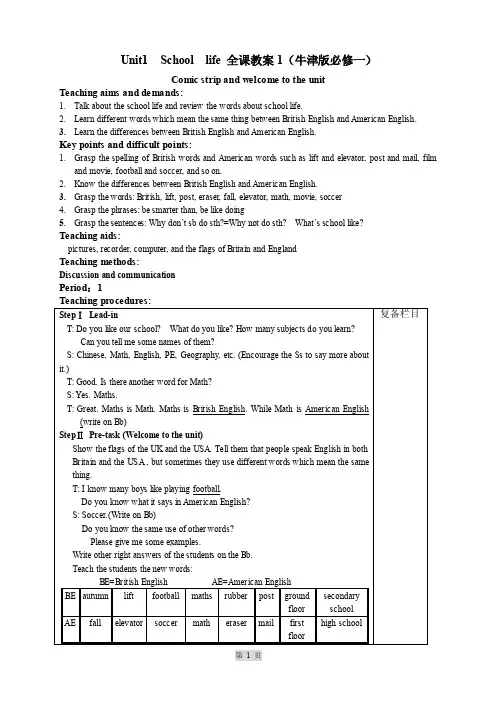
Unit1 School life 全课教案1(牛津版必修一)Comic strip and welcome to the unitTeaching aims and demands:1.Talk about the school life and review the words about school life.2.Learn different words which mean the same thing between British English and American English.3.Learn the differences between British English and American English.Key points and difficult points:1.Grasp the spelling of British words and American words such as lift and elevator, post and mail, filmand movie, football and soccer, and so on.2.Know the differences between British English and American English.3.Grasp the words: British, lift, post, eraser, fall, elevator, math, movie, soccer4.Grasp the phrases: be smarter than, be like doing5.Grasp the sentences: Why don‟t sb do sth?=Why not do sth? What‟s school like?Teaching aids:pictures, recorder, computer, and the flags of Britain and EnglandTeaching methods:Discussion and communicationPeriod:1Reading(1)Teaching aims and demands:1.Know the school lives in British school and American school.2.Learn to read and understand the article with different ways of reading.3.Learn how to understand the writer‟s opinion.Key points and difficult points:1. Know the meanings of the new words: mixed, together, subject, myself, tasty, meal, guy(s), twice, softball, practice, buddy, senior, hero, close, article, admire2. Understand the meanings of the phrases: in Y ear 8=in Grade 8,a mixed school, Home Economics, learn how to do sth, do sth for oneself, cook healthy and tasty meals, bring in, a Reading Week, the end of sth, as well, take a bus, twice a week, spend time doing sth, learn about, help sb with sth, each other, have a great time doing sth.3. Can use this sentence: What does the word …hero‟ mean?It means someone you admire very much.Catch the main information about Lives in a British school and an American schoolTeaching aids: Recorder and computerTeaching methods: Asking and answering questions, communication and discussion Period:2Reading 2Teaching aims and demands:1.Can grasp the words, phrases and language points of the two articles.2. Can retell the lives in a British school and an American school.Key points and difficult points:1. Some important language points.2. Retell the two articles completely.Teaching aids: Recorder, a small blackboardTeaching methods: Explanation and exercisePeriod:3Period:9-4Teaching aims and demands:1.Learn about the school subjects.2.Review and learn the adjective nouns about people‟s opinion.3.Grasp the opposites of the adjective nouns.Key points and difficult points:1. Grasp the new words such as art, geography, language, PE, science, useful, unimportant, useless,unpopular and so on.2. Can give opinion on different school subjects.Teaching aids: Computer and the timetableTeaching methods: Summarize and explanationPeriod:9-4Grammar A&BTeaching aims and demands:pare two things using …more…than‟, …fewer…than‟ and …less…than‟.2. Compare more than two things using …the most‟ for the largest amount and …the fewest‟/ …theleast‟ for the smallest amount.Key points and difficult points:1.How to use …more…than‟, …fewer…than‟ and …less…than‟.2.How to use …the most‟ …the fewest‟ and …the least‟. Teaching aids:Teaching methods: pictures, objects and computer Period:5Grammar C& CheckoutTeaching aims and demands:1.Can make comparisons using …the same as‟ and …different from‟.2.Can make comparisons using …the same…as‟.Key points and difficult points:Grasp the sentences like these: My uniform is the same as Simon‟s uniform.My uniform is different from John‟s uniform.Millie‟s pencil box is the same size as Amy‟s pencil box. Teaching aids: Objects and picturesTeaching methods: Exercise and explanationPeriod:6Teaching procedures:Integrated skills (A)Teaching aims and demands:1.Listen to the conversation and try to collect the information.2.Learn more differences of the school lives between China and foreign countries.3.Review the Grammar we have learned.Key points and difficult points:1.How to collect the information you need from the conversation.2.Grasp the Grammar masterly.Teaching aids: RecorderTeaching methods:Asking and answering questions, discussion, practice Period:7Teaching procedures:Speak up & PronunciationTeaching aims and demands:1.Can talk about different schools.2.Can read the dialogue and the sentences in right intonations.3.Know that we make our voice fall at the end of an affirmative sentence. Know that we make our voice rise at the end of a sentence to show surprise. Key points and difficult points:1.Talk about different schools.2.Showing surprise.Teaching aids: RecorderTeaching methods: Reading and practicingPeriod:8Teaching procedures:Main task Period:9-9Teaching aims and demands:1.Learn how to finish the questionnaire with personal information.2.Learn to make a timetable according to the questionnaire.3.Learn to write …My ideal school‟.Key points and difficult points:1.How to know about what people like and dislike.2.How to write …My ideal school‟.Teaching aids:Recorder and computerTeaching methods:Answering the questions of students‟, explanation and exercise。
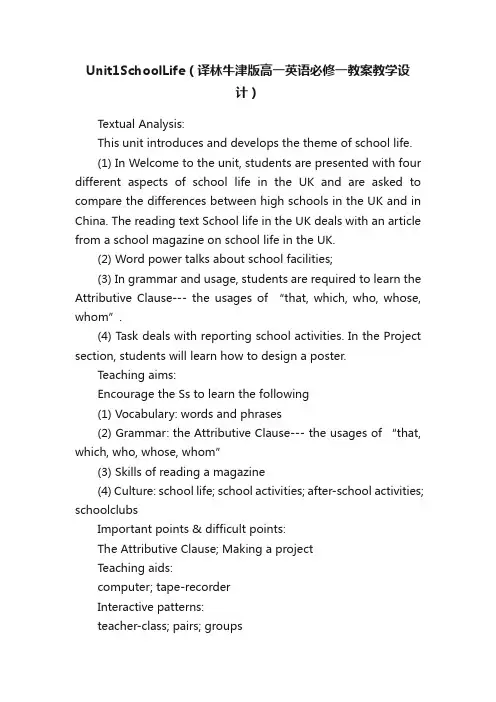
Unit1SchoolLife(译林牛津版高一英语必修一教案教学设计)Textual Analysis:This unit introduces and develops the theme of school life.(1) In Welcome to the unit, students are presented with four different aspects of school life in the UK and are asked to compare the differences between high schools in the UK and in China. The reading text School life in the UK deals with an article from a school magazine on school life in the UK.(2) Word power talks about school facilities;(3) In grammar and usage, students are required to learn the Attributive Clause--- the usages of “that, which, who, whose, whom”.(4) Task deals with reporting school activities. In the Project section, students will learn how to design a poster.Teaching aims:Encourage the Ss to learn the following(1) Vocabulary: words and phrases(2) Grammar: the Attributive Clause--- the usages of “that, which, who, whose, whom”(3) Skills of reading a magazine(4) Culture: school life; school activities; after-school activities; schoolclubsImportant points & difficult points:The Attributive Clause; Making a projectTeaching aids:computer; tape-recorderInteractive patterns:teacher-class; pairs; groupsTeaching methods:Audio-visual method; Direct method; Functional approach Teaching process:Welcome to the Unit: (0.5 period)(1) Warming up questions(2) Talk about the pictures(3) More questionsReading: (1.5 periods)(1) Lead-in(2) First reading(3) Further reading(4) Text Check(5) Notes/language points(6) ExercisesGrammar (task-teaching method) (2 periods)(1) explanation(2) exercisesWord power (1.5 periods)(1) text learning(2) more exercisesProject (1.5periods)(1) text learning(2) more practiceSelf-assessment (1 period)/Test (1 period)Periods:Welcome to the Unit: (0.5 period)(1) Warming up questionsa. What school were you at last term?b. Why did you choose our senior high school?c. Are there any differences?(2) Talk about the picturesa. Huge campus and low-rise buildingsb. Lockers for every studentc. Fewer students in each classd. At ease with our teacher(3) More questionsa. Do you know of any other differences between the lives of Chinese and British high school students?b. What kind of school activities do you enjoy?c. What is your dream school life like?预习专练I.请根据句意填写适当的单词1. Going to a foreign high school for some time is very ________(开心) and exciting.2. Almost no high school students are ___________ (满意)with the school hours in China.3. I know from my own ____________(经历) how difficult this kind of work can be.4. I felt lucky as all my teachers were very ___________ (有助)and I enjoyed all my subjects.5. Sometimes I played football with the boys. Sometimes I just ________ (放松)under a tree or sat on the grass.6. George Bush was invited to a__________ the APEC held in Shanghai.7. My English i_________ a lot as I used English every day and spent an hour each day reading English books in the library.8. The paintings that David d__________ to the school are being displayed in the assembly hall.9. Though it didn’t look l________ a table when it was finished, I still liked it very much.10. British people eat lots of desserts after their m_________ meal.Reading: (1.5 periods)(1)Lead-inHow long did Wei Hua stay in Britain?What was the name of Wei Hua’s class teacher?What did Wei Hua make in her Woodwork class?(2) First readingExercises: (P4)C1/C2(3) Further readingMake an interview.S1-S2(Wei Hua)Write an article about the differences between high schools in the UK and in China.(4) Text CheckGoing to ____ British high school for one year was ____ very enjoyable and exciting experience for me. I was very happy ______the school hours in Britain because school ______ around 9 a.m. and ends about 3.30p.m. This means I could get up an hour later ________ as schools in China begin before 8 a.m. On the first day, all students went to attend _______ assembly. I sat _______ a girl _______ name was Daniel.We soon became best ______. The best way ______ ____respect from the school was ______ hard and achieve high grades. This sounded ______ my school in China. I _____ many teachers in the past year and they each taught only one ________. Miss Burke was the teacher ______ taught us English literature. This is about the ________ size for British schools. We had to _______ different classrooms _____ different classes. I found the homework was not as _____ as ____I used to get in my oldschool, but it was a little ________ for me at first because all my homework was ____ English. I felt lucky as all my teachers were _________ and I enjoyed all my subjects. My English _______ a lot as I used English every day and spent an hour each day _____ English books in the library. I usually e-mailed my family and friends back home _____ at lunchtime. I also had an _____ French class ____ Tuesday evenings. Cooking was really ___ great fun as I learned how to buy, prepare and cook food. At the end of the term we ____ a class party and we all had to cook something.(5) Notes/language points重点词汇解析attend v. 参加原句在线:__________________________________________________________________ According to the law in China, all children between 6 and 14 must attend school. 根据中国法律,六到十四岁的儿童必须上学。
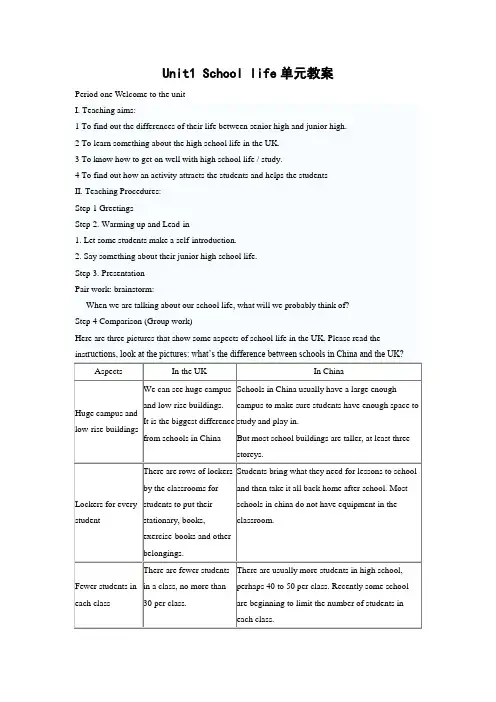
Unit1 School life单元教案Period one Welcome to the unitTeaching Plan for Unit 1 School life Period two ReadingTeaching aims:1. To read a magazine article about school life in the UK.2. To learn to apply two basic reading skills: skimming and scanning.3. To learn some expressions about school life.Teaching procedures:Step 1 RevisionCheck the homework exercise.Step 2 PresentationYesterday discussed the differences between high schools in our country and the UK.2. Read the two articles in reading on pages 82 and 83 in wb and answers the questions below them.3. Daniel Adams will come to your school as an exchange student. Write a letter to him and introduce your school life to him.4. Preview the following lesson.Teaching Plan for Unit 1 School life Period three Language focusb) I do like eating.Step 5. Practice1. Complete wb A1, A2,2. Translation1)Jim加入了我们的讨论之列。
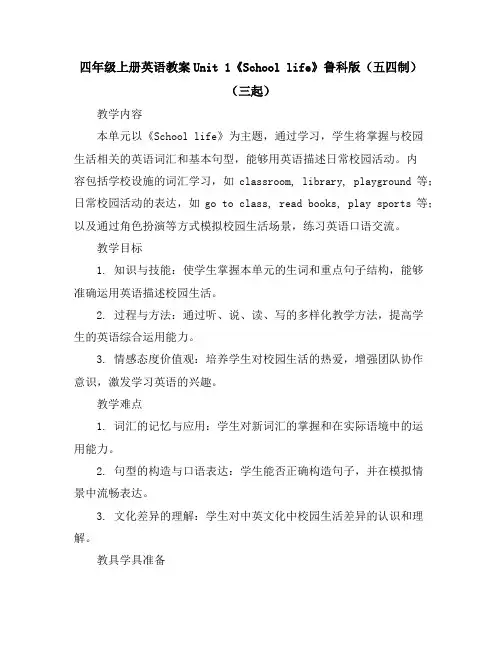
四年级上册英语教案Unit 1《School life》鲁科版(五四制)(三起)教学内容本单元以《School life》为主题,通过学习,学生将掌握与校园生活相关的英语词汇和基本句型,能够用英语描述日常校园活动。
内容包括学校设施的词汇学习,如classroom, library, playground等;日常校园活动的表达,如go to class, read books, play sports等;以及通过角色扮演等方式模拟校园生活场景,练习英语口语交流。
教学目标1. 知识与技能:使学生掌握本单元的生词和重点句子结构,能够准确运用英语描述校园生活。
2. 过程与方法:通过听、说、读、写的多样化教学方法,提高学生的英语综合运用能力。
3. 情感态度价值观:培养学生对校园生活的热爱,增强团队协作意识,激发学习英语的兴趣。
教学难点1. 词汇的记忆与应用:学生对新词汇的掌握和在实际语境中的运用能力。
2. 句型的构造与口语表达:学生能否正确构造句子,并在模拟情景中流畅表达。
3. 文化差异的理解:学生对中英文化中校园生活差异的认识和理解。
教具学具准备1. 多媒体教学设备:用于播放课件、视频和音频资料。
2. 图片卡片:用于词汇教学的视觉辅助。
3. 角色扮演道具:模拟校园生活场景,增强学生参与感。
4. 教学录音机:用于录音和播放学生的口语练习。
教学过程1. 导入:通过展示校园图片,引导学生回顾校园生活,激发学习兴趣。
2. 新授:介绍本课的主要词汇和句型,通过例句解释用法,让学生跟读并模仿。
3. 实践:分组进行角色扮演,模拟校园生活场景,鼓励学生用英语交流。
4. 巩固:通过课堂练习和小游戏,加深学生对词汇和句型的记忆。
6. 作业布置:布置相关的书写和口语作业,巩固学习成果。
板书设计板书将围绕本课的核心词汇和句型进行设计,清晰展示教学内容,方便学生记录和复习。
同时,板书还将包含关键的语法点和注意事项。
作业设计1. 书面作业:完成课后练习题,巩固词汇和句型。
Unit 1 School lifeTeaching aims of the whole unit:1.Develop students’ ability of reading comprehension by reading an article about school life in the UK and two other articles about school clubs.2.Develop students’ ability of listening comprehension by listening to two talks about school activities.3.Develop students’ speaking ability by discussing daily school life and reporting school activities.4.Develop students’ writing ability by writing a notice about school activities.5.Develop students’ integrated skills of using English by making a poster for a school club.6.Enlarge students’ vocabulary about school facilities.7 Help students understand what an attributive clause is and what relative words function as in attributive clauses; teach students how to use relative pronouns that, which, who, whom and whose.Period arrangement:The whole unit: 12 periodsWelcome to the unit: 1 periodReading: 2 periodsWord power: 1 periodGrammar and usage: 2 periodsTask: 2 periodsProject: 2 periodsSelf-assessment: 1 periodRevision and exercises: 1 periodPeriod 1 Welcome to the unitI. Teaching aims:1 Get students to know the different high school loves between the UK and China.2 Develop students’ English speaking skills.II. Teaching Procedures:Step 1. Warming upLet some students make a self-introduction.1. Introduce themselves.2. Say something about their junior high school life.3. Pair work: brain storm:When we are talking about our school life, what will we probably think of?What words or phrases will we use to describe our school life? Step 2 Presentation1.Say the following to students:It’s the beginni ng of the new term. You’ve just finished your junior high and are about to enter a new period in your studies. I am happy to give your lessons and I hope we can be friends.I can see that some of your are eager to know what studying at senior high will be like. Will it be differ4ent from junior high? Well, there are certainly many differences between junior high and senior high, but there are also some things that are the same in every school in China. What about schools in other countries? Do you have different experiences? Are schools all over the world the same? This is the subject of our first unit.2. Ask students to read the instruction and tell them:Here are three pictures that show some aspects of school life in the UK. Please read the instructions, look at the pictures: what's the difference between schools in China and the UK?Step 3 Discussion1 Ask students the following questions to talk about the words in the four pictures:Huge campus and low-rise buildingsWhat does huge mean?What does low-rise mean?What about campus and school buildings in China?(Schools in China usually have a large enough campus to make sure students have enough space to study and play. But most school buildings have at least 3 storeys.)Lockers for every studentDo you know what a locker is?(There are rows of lockers by the classrooms for students to put their bookd, exercise-books and other belongings.)What do you think about locker for students?Do you think that we should have such locker in our school? Why or Why not?Fewer students in each classHow many students are there in our class?Do you know the number of students in a class in the UK?At ease with our teacherWhat can we know from this picture?What does the word ease mean? What do you think the phrase at ease mean?Were you getting on well with the teacher when you were in junior high?What relationship do you want to have with your teachers in senior high?2 Ask students to work in groups to talk about the four pictures and the differences between schools in the UK and China. Then ask several students to report their discussion to the whole class.aspects In the UK In ChinaHuge campus and low-rise buildings We can see hugecampus andlow-rise buildings.It is the biggestdifference fromschools in ChinaSchools in China usually have alarge enough campus to make surestudents have enough space tostudy and play in.But most school buildings aretaller, at least three storeys.Lockers for every student There are rows oflockers by theclassrooms forstudents to put theirstationary, books,exercise-books andother belongings.Students bring what they need forlessons to school and then take itall back home after school. Mostschools in china do not haveequipment in the classroom.Fewer students in each class There are fewerstudents in a class,no more than 30 perThere are usually more students inhigh school, perhaps 40 to 50 perclass. Recently some schools areclass. beginning to limit the number ofstudents in each class.At ease with our teacher Students have aclose relationshipwith their teachers.They feel at easeand comfortablewith them.It is similar in china. Nowadays,lots of teachers and students haveestablished a good relationshipwith each other. They respect eachother and work to gain a betterunderstanding of each other.3. Ask students to discuss the three questions in pairs, and them ask some of them to report their answers to the questions to the whole class.What is your dream school life like?What kind of school activities do you enjoy?What do you think of your life here in the new school?Step 4 Summary and HomeworkToday we’ve mainly talked about the differences between the high school lives in the UK and in China. After class you should:1) Recall all the new words and expressions that we learn in this lesson.2) Find more about any other differences between the high school lives in the UK and in China, either by surf the Internet or by reading some articles in newspapers or magazines.3) Preview the following part: reading (page 2 to page 4).Period 2 Reading (1) School life in the UKTeaching aims:1. Get students to know what school life is like in a high school in the UK.2. Develop students’ ability of reading comprehension through:1)skimming and scanning.2)Guessing the meanings of some new words from the context3. To learn some expressions about school life.Teaching procedures:Step 1 Lead-in and PresentationSay the following to the students:Yesterday we’ve talked about the differences between the high school lives in the UK and in China. We know well about the high school lives in China, because we are Chinese. But we know a little about the high school lives in the UK. Yeah? Today we are going to read a magazine article which is written by an exchanging student. She has been studying in the UK for one year. Now she gives a clear brief introduction about her school life there.(Bb: School life in the UK) Before we read the article, we are going to learn the reading strategy: skimming and scanning.Please look at page 3: Reading strategy. (Bb the following while learning the reading strategy. )Skimming: to get a general idea of the article, without studying it in detail.Focus on the titles, headings, the first and last sentences or paragraphs, charts and pictures …scanning: to find certain information in an article quickly.Look for key words and phrases, dates and numbers, etc.Step 2. Reading1. Skimming:Question: How does Wei Hua feel about her life in the UK?2. Scanning:1)Ask students to go through the three questions in part A and makesure that each of them know the meaning of each question.(AWoodwork class is a class in which students make somethingfrom wood.)Ask students to read the passage as quickly as possible and try to find answers to the three questions. Remind students only tofocus on and identify the most important information.2)Ask student to reread the passage and complete Part C1individually. Then ask some of them to give the answers to thequestions in Part C13)Ask students to finish Part C2 individually. Then get somestudents to share their answers with the whole class. Ask them to say the true sentences to correct the false ones.3 GuessingAsk students to finish Part D individually. Tell them not to look up the meanings of the words from the wordlists in the textbook. Let themguess the meanings from the context. Then check the answers with the whole class.Step 3 New Words in this UnitStudy the new words appears from page2 to page 5 (from attend to immediately) at page 68.Step 4. Homework.1. Complete part E on page 5.2. Read the two articles in reading on pages 82 and 83 in wb and answers the questions below them.3. Learn all the new words we learned today by heart.Period 3 Reading (2) School life in the UKTeaching aims:1 Help students become more familiar with the article.2 Develop students’ ability of reading comprehension by finding out what topics are covered in the article.3 Develop students’ ability of speaking by discussing the subjects they like in school.Teaching Procedures:Step 1. Revision:Check the homework:1)Have a dictation to go over the words learned last period.2)Check the answers in reading on pages 82 and 83 in wb.3)Ask some students to read the article in Part E to check whetherthey have used the suitable word in each blank.Step 2 Reading1) Ask some students to read the article aloud paragraph by paragraph. Ask other students to find out what topics are covered in it.School hoursSchool assemblyTeachersClass sizeDifferent classes in different classroomsHomeworkSubjects and favourite subjectsWhat to do at lunchtimeBritish food3)Ask students to point out the different high school lives in the UKand in China in these topics.Step 3 DiscussionLet students look at Part F together and discuss the questions in Part F in Pairs. Then get some pairs to act out their discussion in class.Step 4 Language focus1 Ask students to find out the following words, phrases and sentences in the article. Then give some explanations.Words:a)as (since, because, for)b)attend (join, join in, take part in)c)prepared)experiencee)respectf)exciting, excitedg)dropPhrases:a)for freeb)be happy withc)used to do sth.; be/get used to do sth.; be/get used to doing sth.d)the way to do; the way of doing; the way + Attributive Clausee)at the end of; in the end; by the end off)as … asSentences:a)Going to a British school for one year has been a very enjoyableand exciting experience for me.b)I do like eating.c)We also had different students in some class, so it was difficult toremember all the faces and names.2 Ask students to put the following sentences into English in their exercise-books.1) Jim 加入了我们的讨论之列。
鲁科版(五四制)小学四年级上英语Unit 1 School lifeUnit 1 School Life教学设计一、教学指导思想与理论依据通过主题实践活动,引导学生掌握听说读的技巧,使他们在实践活动中学会综合地运用语言知识,从而提高语言运用能力和实践能力,达到终身学习的目的。
二、教学背景分析1.教材分析Unit 1 School Life 主要学习运用了句型:What subjects do you have at school? We have … in the morning/ afternoon. 和What’s your favourite subject? It’s … (I like…) 通过创设情景教学,营造开放和谐的学习环境,突破教学重、难点,使学生在学习过程中敢想敢说敢问敢做,在知识的掌握和技能的形成过程中,充分展示自我,体验成功的快乐。
2.学情分析这个班的学生经过三年级一年的英语学习,有了一定的语言基础,孩子们上课能够主动参与课堂,积极的发言,相互合作和帮助。
但个别同学在课堂上仍然需要给予鼓励,这样他们在课堂上才能持续认真听讲,顺利完成学习任务。
三、教学目标设计1. 课标要求知识与技能:能够熟练运用句型:What subjects do you have at school?We have … in the morning/ afternoon. What’s your favourite subject?It’s … (I like…) 并根据情景进行对话练习。
过程与方法:为学生提供主动探究的最大空间,鼓励参与,积极合作,主动请教,培养学生的实践能力,获取信息的能力。
情感态度与价值观:提高对英语的学习热情,培养对英语学习和对学校生活的热爱,培养学生的全面发展意思。
2. 学习目标能够熟练运用句型:What subjects do you have at school?We have … in the morning/ afternoon.What’s your favourite subject?It’s … (I like…) 并根据情景进行对话练习。
牛津译林版高中英语必修一Unit 1《School Life》(Project)教案【教学目标】1.to arouse students’enthusiasm for developing after-class activities and forminga school club;2.to gain the general idea of how to make an attractive poster for the club;3.to strengthen students ability of putting theory into practice;4.to guide students to cooperate effectively through group work.【教学重点】Have students discuss and learn to finish a project by working tog hter 【教学难点】Students should search and find information, and do some writing and drawing by themselves【教具】Multi-media projector【二次备课】【教学过程】Step 1 Which is more attractive?[设计说明] 由两段录音展现两种风格完全不同的社团招募方式,让学生选择其一,并阐述其选择的理由,从而进入预设话题。
*Sample A:We have a radio club in our school.*The history of our club:It was set up in…/by.../when…*The aims of our clubs are …1)…2)…*The related activities are…1)…2)…Do you want to join us? (boring & old-typed)*Sample B:Are you impressed by the soft background music?Do you have any idea of the beautiful story behind it?The one that would ever touch your deep heart… (charming &attractive)Step 2 Attract Your Eyes & Grasp Your heart[设计说明]带领学生一步步为short play club 设计一份宣传海报,并在其过程中引导学生发觉、总结设计一份成功海报的要诀所在。
牛津高中英语模块一(第1讲)【教学内容与教学要求】一、教学内容:牛津高中英语模块一Unit 1 (上)二、教学要求:1.掌握和校园生活有关的常用单词、词组与句型。
2.学会描述校园生活和学校设施。
High school is a time of discovery, learning and hard work!高中是探索、学习和辛勤劳动的时期Huge campus and low-rise building 学校面积大,没有高层建筑。
Twelve laboratories are available for different 个实验室可供不同试验使用。
Each room comes with its own bothroom and Internet access.每个房间都有自己的卫生间和英特网接口。
3.学习阅读技巧:skimming&scanning。
4.语法:定语从句(一)【知识重点与学习难点】一、重要单词:access achieve attend assembly article available average canteen club challenging context donate display experience extra graduate gym heading locker low-rise literature poster relax二、重点词组:class teacher 班主任 at ease with 和….相处不拘束 school hours学校作息时间 earn respect from 赢得…的尊敬 sound like听起来象 for free 免费 get a general idea 了解大意 as well as 除….以外, 也 key words 关键词 word by word 逐字逐句地 find one’s way around 认识路 develop an interest in 培养对….的兴趣 surf the Internet网上冲浪【难点讲解】1.What is your dream school life like?你理想中的学校生活是什么样子?这里dream表示心目中最理想的. 如 dream team (梦之队)。